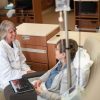Introduction
Chemotherapy treatment is undergoing a revolution. Once standardized across broad diagnoses, cancer regimens today are increasingly personalized—demanding not only clinical precision, but also multidisciplinary coordination. At the center of this evolution stands the oncology pharmacist, whose role has shifted from quiet dispenser to strategic leader within cancer care teams. This article explores their expanding responsibilities and why companies should be investing in global pharmacy talent to navigate tomorrow’s oncology challenges.
Regimen Preparation and Customization
As precision medicine takes hold, oncology pharmacists are instrumental in tailoring chemotherapy regimens based on genetic markers, comorbidities, and evolving therapeutic protocols. They evaluate dosing schedules with milligram accuracy, assess potential drug-drug interactions, and anticipate metabolic variations based on patient profiles. Software-assisted modeling and AI-powered prescription platforms—like DoseEdge or ScriptPro—enhance their capacity to handle large volumes of data, reduce errors, and align protocols with the latest clinical trials.
Toxicity Monitoring and Mitigation
Managing toxicity is no longer reactive—it’s proactive. Oncology pharmacists monitor lab values, symptom logs, and patient-reported outcomes to flag adverse effects before they escalate. By integrating predictive analytics tools, they can model risks like neutropenia or organ toxicity, helping oncologists revise regimens in real time. They also guide supportive therapy, recommending interventions such as granulocyte-colony stimulating factors or antiemetics, to maintain treatment continuity.
Patient Education and Empowerment
Pharmacists are not only clinical experts—they’re educators. Oncology pharmacists provide tailored counseling on chemotherapy schedules, side-effect expectations, and strategies for adherence. This engagement builds trust and improves outcomes: studies show that patients who receive pharmacist-led education experience fewer hospitalizations and better medication compliance. Mobile apps like Medisafe and Care4Today also support these efforts, fostering digital connections that enhance long-term adherence.
Integrated Oncology Care Teams
Cancer care today is collaborative. Pharmacists work alongside oncologists, nurses, radiologists, and nutritionists in tumor boards and treatment planning meetings. They contribute clinical insights that influence decisions on regimen changes, dose adjustments, and off-label use. Hospitals implementing pharmacy-led tumor boards have reported improved patient satisfaction and more streamlined care pathways.Conclusion
Oncology pharmacists embody the future of high-touch, high-tech cancer care. Their combination of clinical insight, patient empathy, and tech fluency makes them indispensable across the treatment spectrum. For healthcare companies and institutions navigating the complexity of oncology regimens, investing in elite pharmaceutical professionals is essential—and Hathaway Worldwide stands ready to connect organizations with top-tier global talent.






